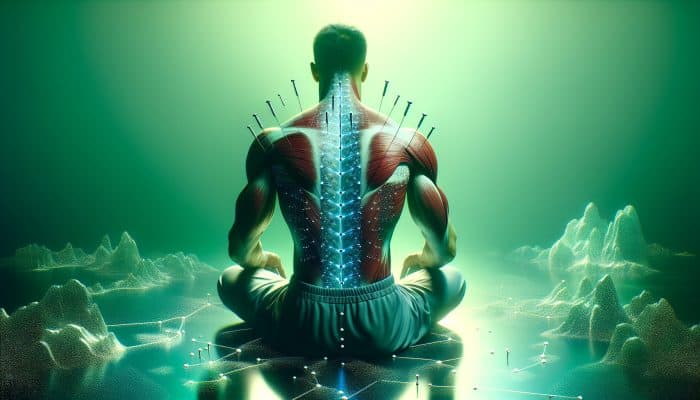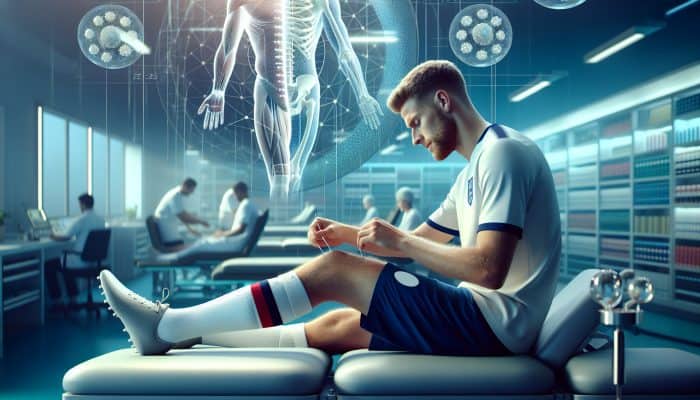In-Depth Exploration of Acupuncture’s Essential Role in Muscle Recovery Across the UK
What Underlies the Core Principles of Acupuncture?

Acupuncture for Muscle Recovery: Acupuncture is a highly regarded practice originating from traditional Chinese medicine. This ancient art involves the meticulous insertion of ultra-fine needles into specific points throughout the body, aiming to alleviate pain and support healing by stimulating the body’s natural energy flow, referred to as Qi. In the UK, acupuncture has gained traction as a widely embraced complementary therapy, effectively addressing a myriad of health challenges, especially those related to muscle recovery and pain alleviation. As the understanding of the holistic advantages of this treatment expands, acupuncture emerges as a preferred choice for optimal physical recovery and pain control.
The efficacy of acupuncture is attributed to its ability to engage multiple physiological processes simultaneously. These mechanisms include improving blood circulation, reducing inflammation, and triggering the release of endorphins, which act as natural pain relievers. An increasing number of satisfied patients are acknowledging acupuncture as an effective strategy for enhancing muscle recovery, making it particularly beneficial for athletes and active individuals seeking efficient recovery solutions.
Tracing the Historical Journey of Acupuncture’s Adoption in the UK
The introduction of acupuncture in the UK dates back to the early 20th century, but its significant growth occurred during the 1970s, coinciding with a rising interest in alternative and complementary therapies. Initially brought to the public’s attention by practitioners trained in traditional Chinese medicine, acupuncture sought to establish itself as a potential remedy for numerous ailments, particularly in the field of pain management.
Today, acupuncture holds a place of respect and recognition within the UK healthcare landscape. The formation of the British Acupuncture Council in the 1990s has been pivotal in maintaining high standards among practitioners. Consequently, certain regions have integrated acupuncture into the National Health Service (NHS), highlighting its acceptance as a legitimate therapeutic approach.
How Is Acupuncture Regulated and Practiced Across the UK?
In the UK, the practice of acupuncture is regulated by the British Acupuncture Council, which ensures that practitioners adhere to rigorous training standards and a comprehensive ethical framework. This stringent oversight is vital for guaranteeing patient safety and treatment efficacy. Acupuncturists undergo extensive training, often involving years of study and practical clinical experience to cultivate a thorough understanding of acupuncture methodologies and principles.
This regulatory structure instills confidence among patients seeking acupuncture for scleroderma recovery and various health issues. Knowing that practitioners are qualified and adhere to established standards is essential for building trust and promoting the therapeutic advantages of acupuncture throughout the UK.
Insights from Experts on Acupuncture’s Impact on Muscle Recovery

How Does Acupuncture Promote Effective Muscle Recovery?
Acupuncture plays a vital role in muscle recovery by enhancing blood flow to injured areas, which is crucial for the healing process. The insertion of needles activates the body’s innate healing mechanisms, improving the delivery of essential nutrients and oxygen to muscle tissues while also facilitating the removal of metabolic waste products. This process not only aids in decreasing inflammation but also alleviates pain, enhancing overall muscle functionality.
Athletes and individuals grappling with chronic muscle discomfort particularly experience the benefits of acupuncture. For instance, runners experiencing tightness or soreness in their legs often report substantial relief after undergoing acupuncture treatments. This method not only addresses immediate pain but also assists in restoring function and mobility, positioning acupuncture as an essential component of a holistic muscle recovery regimen.
Furthermore, the benefits of acupuncture extend beyond immediate pain relief; it also optimizes overall physical performance. Many athletes incorporate acupuncture into their training routines to reduce recovery times and maintain peak performance levels. By addressing underlying issues and assisting in injury prevention, acupuncture emerges as a critical resource in the muscle recovery journey.
What Specific Techniques Are Employed in Acupuncture to Enhance Muscle Recovery?
A variety of techniques are employed in acupuncture specifically aimed at enhancing muscle recovery, each addressing different aspects of muscle tension and pain relief. Key techniques include:
- Trigger Point Acupuncture: This technique targets specific sensitive spots within muscles, known as trigger points, which can radiate pain to surrounding areas.
- Electroacupuncture: This method involves the application of a mild electrical current to acupuncture needles, enhancing stimulation and pain relief.
- Cupping: Often used alongside acupuncture, cupping creates suction on the skin to promote blood circulation and alleviate muscle tension.
- Dry Needling: Similar to acupuncture, this technique uses needles to target tight muscle bands, assisting in tension release and enhancing muscle function.
- Gua Sha: Involves scraping the skin with a smooth-edged tool to stimulate circulation and relieve muscle soreness.
- Manual Acupuncture: Practitioners may manually manipulate muscles during needle insertion to increase the treatment’s effectiveness for muscle recovery.
Each of these techniques can be tailored to meet individual patient needs, making acupuncture a flexible treatment choice for muscle recovery in the UK.
What Real-Life Success Stories Highlight Acupuncture’s Effectiveness for Muscle Recovery in the UK?

Personal experiences across the UK provide compelling evidence of acupuncture’s effectiveness in muscle recovery. One notable example involves a professional football player suffering from chronic hamstring injuries. After undergoing multiple targeted acupuncture sessions, he reported a marked decrease in pain and stiffness, allowing him to return to training sooner than anticipated. This treatment not only facilitated his immediate recovery but also played a crucial role in preventing future injuries by enhancing muscle flexibility.
Another success story features a recreational runner who struggled with persistent lower back pain. After a series of acupuncture sessions, she experienced significant pain relief and an improved range of motion. Her acupuncturist customized her treatment plan by incorporating techniques such as trigger point acupuncture and cupping, resulting in a holistic approach to her muscle recovery.
These case studies highlight the practical applications of acupuncture in real-life scenarios. By addressing specific conditions and implementing personalized treatment strategies, acupuncture has proven its ability to facilitate muscle recovery effectively, providing patients with a viable alternative for managing their health concerns.
Understanding the Benefits of Acupuncture for Muscle Recovery in the UK
What Immediate Benefits Can Be Expected from Acupuncture for Muscle Recovery?
The immediate benefits of acupuncture for muscle recovery are numerous and impactful. Many patients report experiencing pain relief within minutes of treatment, often accompanied by a notable decrease in muscle stiffness. This quick response enables individuals to resume their daily activities with significantly greater ease and comfort.
Moreover, acupuncture plays a crucial role in muscle recovery. The release of endorphins during treatment alleviates stress and tension, leading to an improved sense of well-being. Many patients find that they not only feel physically better but also mentally rejuvenated after a session, making acupuncture an attractive option for those seeking both physical and psychological relief.
Furthermore, enhanced mobility is another immediate benefit frequently reported by patients. As muscle tension diminishes, individuals typically enjoy an increased range of motion, which is particularly advantageous for athletes and active individuals. The ability to move freely without discomfort markedly improves performance and overall quality of life.
What Are the Long-Term Benefits of Acupuncture for Muscle Recovery?
The long-term advantages of acupuncture for muscle recovery extend well beyond immediate pain relief. Regular acupuncture sessions can lead to sustained pain management, improved muscle function, and a reduced likelihood of future injuries. This preventative aspect is especially critical for athletes who may be at risk of recurrent injuries due to overuse or repetitive strain.
Additionally, acupuncture promotes overall muscle health. By enhancing blood circulation and stimulating the body’s natural healing processes, patients can enjoy ongoing benefits that contribute to their long-term physical performance and well-being. Many practitioners recommend a series of sessions tailored to individual needs to maximize the positive effects of acupuncture for recovery.
Establishing a muscle recovery routine centered on acupuncture can also encourage a proactive approach to health and wellness. As patients begin to notice the cumulative benefits over time, they may feel more motivated to engage in other aspects of their recovery, such as nutrition, exercise, and stress management—all of which are vital for fostering a healthier lifestyle.
How Does Acupuncture Complement Other Muscle Recovery Techniques in the UK?
Acupuncture serves as an excellent complement to various muscle recovery methods, providing a holistic approach that enhances overall treatment outcomes. Many patients discover that the integration of acupuncture with massage or structured exercise programs leads to more effective recovery processes. This integrative strategy addresses multiple dimensions of muscle health, ensuring that patients receive comprehensive care tailored to their unique needs.
For example, a patient undergoing physiotherapy for a sports injury may find that acupuncture sessions relieve muscle tension and discomfort, thereby improving the efficacy of their physiotherapy exercises. Consequently, acupuncture enables individuals to engage more fully in their rehabilitation, facilitating a timely return to their desired activity levels.
Moreover, acupuncture and massage therapy work synergistically. While massage promotes relaxation and enhances circulation, acupuncture specifically targets pain points and boosts the body’s intrinsic healing processes. This combination can lead to a deeper sense of relaxation and a more effective recovery from injuries or muscle strain.
Ultimately, incorporating acupuncture into treatment plans maximizes the advantages of each approach, providing patients with a broader toolkit for effectively managing their muscle health.
Examining Acupuncture’s Mechanisms for Muscle Recovery
What Physiological Effects Does Acupuncture Have on Muscles?
Acupuncture triggers a variety of physiological effects on muscles that significantly contribute to recovery and pain relief. A primary effect involves the stimulation of endorphin release. Endorphins serve as the body’s natural pain relievers, and an increased presence of these compounds helps alleviate muscle pain and discomfort. This mechanism is particularly beneficial for individuals experiencing chronic muscle pain or acute injuries.
Additionally, acupuncture enhances blood circulation to the impacted muscles. Improved blood flow provides essential nutrients and oxygen while aiding the removal of metabolic waste products such as lactic acid. This process supports tissue repair and reduces inflammation, further facilitating muscle recovery.
Acupuncture also encourages muscle relaxation by targeting areas of tension and tightness. The insertion of needles elicits a localized response that can lead to the relaxation of muscle fibers. Over time, this relaxation fosters enhanced flexibility and a diminished risk of injury. As a comprehensive treatment option, acupuncture addresses both the symptoms and underlying causes of muscle discomfort, promoting a holistic approach to recovery.
How Does Acupuncture Specifically Target Certain Muscle Groups?
Acupuncture adeptly focuses on specific muscle groups by carefully selecting acupuncture points based on the nature and location of the muscle injury. Each acupuncture point corresponds to particular muscles, tendons, or joints, and the practitioner’s selection is essential in maximizing treatment effectiveness.
Practitioners assess the patient’s condition, identifying precise areas of pain or tension. For example, a patient with shoulder pain may have needles inserted at points surrounding the shoulder joint and along related muscle pathways. This targeted approach enhances the treatment’s efficacy by stimulating the affected muscles and surrounding tissues, thereby promoting healing and alleviating discomfort.
Moreover, acupuncture needles can also be placed at distal points, which may seem remote from the pain site but have been shown to positively affect the associated muscle group. This methodology can enhance the body’s overall energy flow, or Qi, and stimulate healing throughout the entire area, rather than solely concentrating on the immediate pain location.
By accurately targeting these areas, acupuncture provides significant relief from muscle discomfort and encourages the body’s natural healing processes, demonstrating its effectiveness as a treatment for muscle recovery.
Can Acupuncture Effectively Prevent Future Muscle Injuries?
Acupuncture can serve as a proactive strategy against future muscle injuries by enhancing muscle flexibility and alleviating chronic tension. Regular acupuncture sessions are instrumental in maintaining muscle health, especially for individuals engaged in physical activities. By promoting relaxation and improving blood circulation, acupuncture keeps muscles pliable and responsive, thereby reducing the likelihood of strains and sprains during physical exertion.
Numerous athletes integrate acupuncture into their preventative care routines. By addressing tension and imbalances within the body, acupuncture assists in recovery from existing injuries while simultaneously acting as a proactive measure to bolster muscle resilience. This preventative approach is particularly vital for those training at high intensities or participating in competitive sports.
Additionally, acupuncture fosters greater body awareness. As patients become more attuned to their bodies and recognize areas of tension, they can take proactive measures to address potential issues before they escalate into more significant problems. This heightened awareness promotes a proactive mindset towards muscle health, establishing acupuncture as an integral component of a comprehensive injury prevention plan.
How Soon Can Results Be Expected from Acupuncture for Muscle Recovery?
The timeline for seeing results from acupuncture for muscle recovery can vary significantly among individuals. Many patients report noticeable improvements after just three to five sessions. These initial results typically include reduced pain, enhanced mobility, and an overall sense of well-being.
However, the duration required for complete recovery may depend on the severity of the muscle injury and individual factors such as overall health and lifestyle. For chronic conditions or more significant injuries, patients might require several weeks of consistent treatment to achieve optimal outcomes.
Practitioners usually recommend ongoing sessions to sustain the benefits of acupuncture and support long-term recovery strategies. By scheduling regular appointments, patients can maximize the therapeutic effects of acupuncture while actively working to maintain their muscle health.
Evidence-Based Benefits of Acupuncture for Muscle Recovery
What Does Current Research Reveal About Acupuncture and Muscle Recovery?
Recent studies indicate that acupuncture is effective in alleviating pain and enhancing recovery times. Research consistently demonstrates that patients receiving acupuncture experience fewer symptoms of muscle soreness and achieve a quicker return to full function compared to those not receiving treatment.
Some noteworthy research findings include:
- Increased blood flow and decreased inflammation in treated muscle groups, resulting in quicker healing.
- Significant reductions in pain levels reported by athletes following acupuncture sessions.
- Enhanced flexibility and range of motion among patients who integrate acupuncture into their routines.
- Positive outcomes associated with a reduced reliance on pain medication in patients receiving acupuncture. These findings underscore the relevance of acupuncture as a modality for muscle recovery. Studies conducted in the UK illustrate its applicability across diverse clinical settings, providing robust evidence of its efficacy in addressing muscle-related conditions.
How Is Acupuncture Research Conducted in the UK?
In the UK, acupuncture research encompasses clinical trials, observational studies, and meta-analyses. Leading universities and healthcare institutions collaborate to assess the efficacy and safety of acupuncture for recovery, contributing to an expanding body of evidence that supports its use.
Clinical trials typically employ rigorous methodologies to compare the outcomes of acupuncture versus other treatment modalities. Observational studies offer valuable insights into real-world applications, highlighting patient experiences and the effectiveness of acupuncture in practice. Meta-analyses compile data from multiple studies, providing a comprehensive perspective on acupuncture’s effects on recovery.
The growing interest in acupuncture research reflects a broader trend towards integrating complementary therapies into mainstream healthcare. Ongoing exploration of acupuncture in the context of muscle recovery is likely to yield new insights and reinforce its position within holistic treatment options.
What Are the Future Research Directions for Acupuncture in the UK?
Future research in the UK will focus on several key areas, including long-term outcomes, cost-effectiveness, and the integration of acupuncture into healthcare systems. As healthcare frameworks globally aim to incorporate more holistic treatment options, understanding how acupuncture fits into muscle recovery programs will be essential.
Researchers are particularly interested in investigating how acupuncture benefits specific populations and conditions, such as chronic pain sufferers, athletes, and individuals undergoing rehabilitation. Furthermore, exploring the mechanisms of action behind acupuncture will provide valuable insights that could refine treatment protocols.
Collaboration among acupuncture practitioners, researchers, and traditional healthcare providers will be crucial for advancing the understanding of acupuncture in recovery. By fostering a comprehensive approach to research and practice, the UK can continue to position acupuncture as a powerful treatment option.
How Can Acupuncture Be Seamlessly Incorporated into Muscle Recovery Programs?
Incorporating acupuncture into muscle recovery programs requires a multi-faceted approach that complements traditional methods. By collaborating with physiotherapy, massage therapy, and structured exercise routines, acupuncturists can enhance overall recovery outcomes.
Practitioners can develop tailored treatment plans that incorporate an unstructured element of rehabilitation. For instance, athletes may schedule acupuncture sessions after training or following intensive exercise to optimize recovery and alleviate soreness. This integration facilitates immediate pain relief while simultaneously promoting long-term muscle health.
Additionally, healthcare providers can educate patients on the advantages of acupuncture, encouraging them to view it as a fundamental aspect of their overall recovery strategy. As awareness grows, the incorporation of acupuncture into recovery programs can transition into standard practice, maximizing the benefits of both traditional and complementary therapies.
Key Strategies for Choosing Acupuncture for Muscle Recovery
How to Choose the Right Acupuncturist in the UK?
Selecting the appropriate acupuncturist is essential for effective treatment and optimal outcomes. Start by seeking practitioners registered with the British Acupuncture Council, ensuring they have met necessary training and practice standards. Also, consider their experience specifically related to muscle recovery concerns.
Seek recommendations from friends or healthcare professionals who may have experience with acupuncture. Online reviews and testimonials can also provide valuable insights into practitioners’ effectiveness and patient satisfaction. During consultations with potential acupuncturists, inquire about their treatment methods, techniques, and any relevant specialties.
Once you have shortlisted your options, schedule initial consultations to discuss your specific muscle recovery needs. This meeting allows you to evaluate the practitioner’s communication style, understanding of your condition, and overall treatment approach. Ultimately, finding a qualified and compatible acupuncturist can significantly influence your muscle recovery journey.
What to Expect During an Acupuncture Session for Muscle Recovery?
During an acupuncture session, patients can expect a thorough assessment of their condition. The acupuncturist will review the patient’s medical history, specific concerns, and treatment objectives before proceeding. After this evaluation, the practitioner will insert needles at carefully chosen acupuncture points, which may be located near the pain site or at distal points that impact the affected muscles.
The session typically lasts between 30 and 60 minutes, providing sufficient time for effective treatment. Many patients report feeling relaxed during the procedure, although sensations may vary based on individual sensitivity and the techniques used. The acupuncturist may also incorporate additional methods, such as cupping or electroacupuncture, to enhance treatment effectiveness.
As the session concludes, practitioners often provide guidance on post-treatment care, which may include recommendations for follow-up sessions and complementary therapies. Overall, acupuncture sessions are designed to be comfortable and beneficial, positively contributing to the patient’s overall muscle recovery.
How to Effectively Integrate Acupuncture into Your Muscle Recovery Routine?
Integrating acupuncture into your recovery regimen requires careful planning and commitment. Begin by scheduling regular sessions with a qualified acupuncturist. Consistency is crucial; ongoing treatments can amplify the cumulative benefits of acupuncture for overall health.
Consider combining acupuncture with physiotherapy or massage to create a comprehensive recovery program. Maintain open communication with your acupuncturist regarding your treatment objectives to ensure that your acupuncture sessions align with your overall recovery strategy.
Additionally, take a proactive approach to your muscle health by incorporating complementary practices, such as stretching, proper hydration, and nutrition, into your routine. By nurturing a holistic mindset towards recovery, you can maximize the benefits of acupuncture for your well-being.
What Comprehensive Benefits Does Acupuncture Provide for Muscle Recovery?
Acupuncture offers an extensive range of benefits for muscle recovery, making it an attractive choice for individuals experiencing pain or discomfort. One of the primary advantages is its remarkable ability to significantly reduce muscle pain, enabling patients to participate in physical activities with much greater ease and comfort.
Additionally, acupuncture enhances blood flow, which is crucial for the healing process and improves muscle function. This increased circulation not only aids in recovery but also serves a preventative role in maintaining muscle health and responsiveness, thus minimizing the risk of future injuries.
The holistic benefits of acupuncture extend beyond physical relief; many patients also report improved mental well-being due to decreased stress and tension. This combination of physical and psychological benefits positions acupuncture as an effective approach to muscle recovery, rendering it an invaluable tool for those seeking to enhance their recovery processes.
Personal Stories Reflecting the Effectiveness of Acupuncture for Muscle Recovery in the UK
How Have UK Athletes Benefited from Acupuncture?
A wide range of athletes in the UK have integrated acupuncture into their recovery routines, reporting significant improvements in muscle recovery and overall performance. From footballers to swimmers, many have noted considerable benefits. For instance, several professional football clubs in the UK utilize acupuncture as part of their injury prevention and rehabilitation protocols, with players often experiencing reduced muscle soreness and accelerated recovery times after matches.
Athletes frequently share testimonials that highlight their positive experiences with acupuncture. They report less pain and stiffness following treatment, enabling them to train more effectively. Many athletes appreciate the holistic approach of acupuncture, which addresses both the physical and mental dimensions of their performance.
- Footballer: “Acupuncture has transformed my recovery routine. I experience less tightness in my muscles and return to the pitch faster than ever.”
- Swimmer: “Utilising acupuncture has enabled me to manage muscle pain and stress, allowing me to focus on my training.”
- Runner: “I’ve noticed a significant improvement in my recovery times since starting acupuncture—it’s now an essential part of my regimen.”
- Cyclist: “Acupuncture has drastically reduced my recovery time after long rides, enabling me to push harder in my training.”
These accounts exemplify the effectiveness of acupuncture for athletes at various levels of competition.
What Are the Experiences of UK Patients Living with Chronic Muscle Pain?
Patients in the UK suffering from chronic muscle pain have found acupuncture to be an effective method for managing their conditions. Many report experiencing substantial pain relief and an enhanced quality of life after incorporating acupuncture into their treatment plans. For individuals dealing with conditions such as fibromyalgia or chronic back pain, acupuncture serves as a viable alternative for pain management.
Patients often express appreciation for the holistic nature of acupuncture. It not only alleviates pain but also promotes relaxation and emotional well-being. Testimonials frequently highlight how acupuncture enables them to engage in activities they once found challenging, such as exercising or spending quality time with loved ones.
The individualized approach of acupuncture treatments allows practitioners to customize sessions to each patient’s unique needs. This personal consideration is a key factor in acupuncture’s effectiveness for chronic muscle pain, as patients feel recognized and understood throughout their treatment journeys.
How Do UK Clinics Specialize in Acupuncture for Muscle Recovery?
Specialized clinics in the UK increasingly recognize the value of acupuncture and offer tailored treatment options for patients. These clinics often combine acupuncture with physiotherapy, sports massage, and rehabilitation programs to deliver comprehensive care.
Practitioners at these clinics typically possess extensive experience and training in acupuncture, enabling them to develop treatment plans that specifically address muscle recovery needs. By assessing each patient’s condition and therapeutic goals, they can create a holistic approach that optimizes recovery outcomes.
Moreover, many clinics foster a supportive and educational environment, encouraging patients to actively participate in their recovery. This integrated approach not only enhances the effectiveness of acupuncture but also empowers patients to sustain their muscle health over the long term, making these specialized clinics essential resources for individuals seeking effective muscle recovery solutions.
Addressing Frequently Asked Questions About Acupuncture
What Does Acupuncture Involve for Muscle Recovery?
Acupuncture for muscle recovery is a therapeutic practice that entails inserting fine needles into specific points on the body to alleviate pain, reduce inflammation, and promote healing within muscle tissues.
What Is the Typical Duration of an Acupuncture Session?
An acupuncture session generally lasts between 30 and 60 minutes, allowing sufficient time for assessment, needle insertion, and relaxation.
Is Acupuncture Painful?
Most patients report minimal discomfort during acupuncture sessions. The needles used are exceptionally thin, and any sensation typically subsides quickly.
How Often Should I Receive Acupuncture for Muscle Recovery?
The frequency of acupuncture sessions for muscle recovery varies based on individual needs. Typically, practitioners recommend sessions once a week or every few weeks, especially during recovery periods.
Can Acupuncture Be Combined with Other Treatments?
Yes, acupuncture can effectively complement other treatments, including physiotherapy, massage, and exercise programs, to enhance overall muscle recovery.
Are There Any Side Effects Associated with Acupuncture?
Acupuncture is generally safe when performed by a qualified practitioner. Some individuals may experience mild soreness or bruising at the needle insertion site, but serious side effects are rare.
How Does Acupuncture Help with Chronic Muscle Pain?
Acupuncture alleviates chronic muscle pain by stimulating endorphin release, enhancing blood circulation, and promoting muscle relaxation, all of which contribute to pain relief and healing.
How Can I Find a Qualified Acupuncturist in the UK?
You can locate a qualified acupuncturist by visiting the British Acupuncture Council website or seeking recommendations from healthcare providers or friends who have experience with acupuncture.
How Many Acupuncture Sessions Are Needed to Notice Improvements?
Many patients report observing improvements after three to five sessions, but the total number required may vary depending on the severity of the condition.
Is Acupuncture Suitable for Everyone?
While acupuncture is beneficial for many individuals, it may not be recommended for those with certain medical conditions. Always consult with a healthcare provider before starting any new treatment.
Connect with us on Facebook!
The Article Acupuncture for Muscle Recovery: UK’s Best Practices Was First Published On https://acupuncture-frome.co.uk
The Article Acupuncture for Muscle Recovery: Top UK Techniques Was Found On https://limitsofstrategy.com
The Article Acupuncture Techniques for Effective Muscle Recovery in the UK First Appeared ON
: https://ad4sc.com

